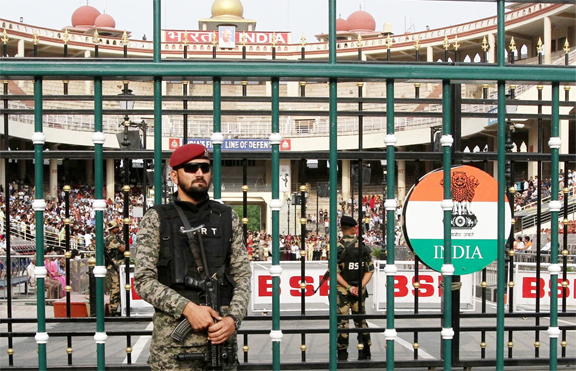DE News Desk :
Global powers have called for calm as escalating hostilities between India and Pakistan following deadly missile strikes threaten to push the nuclear-armed neighbours toward open conflict.
The United Nations and the United States have both urged restraint after Indian missile strikes targeted sites inside Pakistani territory, an action Islamabad has denounced as an “unprovoked act of war.”
UN Secretary-General António Guterres expressed “deep concern” over the cross-border military escalation.
“The world cannot afford a military confrontation between India and Pakistan,” said UN spokesperson Stéphane Dujarric, urging both sides to de-escalate immediately and avoid further violence.
In Washington, Democratic Senator Jeanne Shaheen echoed the call for restraint, urging both countries to prioritize diplomacy.
Referring to the April 22 attack on Indian civilians — which India blames on Pakistan-based militants — Shaheen said justice must be pursued, but warned against allowing the situation to spiral.Islamabad, however, strongly condemned India’s actions.
In a statement, Pakistan’s Foreign Ministry accused New Delhi of targeting civilian infrastructure, including a mosque, and claimed women and children were among the casualties.
The ministry rejected India’s justification that it had struck “terrorist infrastructure,” calling it a baseless excuse aimed at deflecting international scrutiny.
“This is a flagrant violation of international law and endangers regional air traffic,” the statement read, adding that Pakistan reserves its right to respond under Article 51 of the UN Charter.
Prime Minister Shehbaz Sharif vowed a “strong and appropriate response,” announcing via social media that military retaliation was already underway.
Pakistan’s Defence Minister Khawaja Asif told international media that five Indian aircraft had been downed and Indian soldiers captured — a claim not independently verified.
Asif added that Pakistan’s response was limited to Indian military assets and deliberately avoided civilian areas.
India, meanwhile, reported that three civilians were killed in Kashmir as a result of Pakistani artillery shelling.
Its Ministry of Defence described its own operation — codenamed “Sindoor” — as “focused, proportionate, and non-escalatory,” stating that nine sites linked to terrorist activity had been struck and no Pakistani military facilities were targeted.
However, Pakistan’s military reported that Indian missiles struck six areas in Pakistan-administered Kashmir and Punjab province, including a religious site where a child was killed.
Hospitals in the affected regions declared emergencies, and dozens of injuries were reported.The fallout has disrupted civilian life on both sides of the border.
Airports in Srinagar, Leh, and Amritsar were shut down, and airlines including Air India, IndiGo, and Qatar Airways diverted flights amid regional airspace uncertainty.
Schools in Pakistan’s Punjab province were closed, and emergency services placed on high alert.
The United Arab Emirates added its voice to the growing international chorus urging restraint, calling for both nations to settle disputes through diplomatic means.
India’s National Security Adviser Ajit Doval briefed U.S. Secretary of State Marco Rubio on the military action, reiterating India’s position that the strikes were based on “credible intelligence” linking Pakistani groups to the April 22 massacre.
Security experts have warned that the current crisis marks one of the most dangerous escalations between the South Asian neighbours in years.
“Both India and Pakistan possess large conventional forces and nuclear weapons.The risk of rapid escalation is very real,” said Michael Kugelman, a South Asia specialist at the Wilson Center.
Civil defense drills were carried out across northern India the same day as the missile strikes, underlining the gravity of the situation.
Public institutions and businesses conducted preparedness exercises amid fears of further escalation.
As global diplomatic pressure mounts, the region remains on edge, with both India and Pakistan facing increasing calls to step back from the brink and avoid a potentially catastrophic confrontation.

